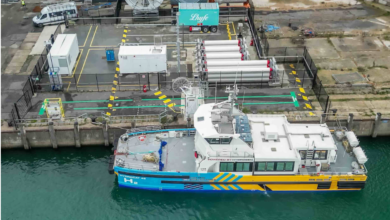Hydrogen is promising, but climate change is an urgent issue for Boeing

Boeing has been working on hydrogen and fuel cell applications for aviation for over 15 years, including four flight demonstration programs. It flew the Boeing Fuel Cell Demonstrator in Spain in 2008 — the first piloted aeroplane in history to use power generated solely by hydrogen fuel cells. In 2012, its ecoDemonstrator program tested similar regenerative fuel cell technology for onboard auxiliary power applications, and Boeing’s Phantom Eye high-altitude and long-endurance uncrewed aircraft flew several flights powered by liquid hydrogen. Over 100 flights on an uncrewed flight demonstrator were conducted during the second project in Spain in 2015.
Boeing and others in the industry are researching green hydrogen as one way to transition to renewable energy and decarbonise aviation. Eliminating CO2 emissions from flying requires many solutions, however, and sustainable aviation fuels are widely recognised as offering the most immediate and largest potential for decarbonisation over the next 20 to 30 years.
“We see promise in a transition to hydrogen fuels over time, but we don’t believe that’s right around the corner given our extensive research and flight demonstrations,” Boeing told H2Bulletin.
The Chicago-based company said that there are formidable challenges to developing aeroplanes powered by liquid hydrogen or electrically driven engines powered by hydrogen fuel cells. Incorporating hydrogen in a safe and practical way will take time and significant investment.
Using liquid hydrogen in combustion engines or to power fuel cells, for example, requires over four times the volume of today’s jet fuel to produce the same amount of energy. And it needs super cold storage — minus 253° Celsius. That will require new and unique aeroplane designs. Liquefying hydrogen through industrial processes also requires substantial energy.
In addition, an all-new green hydrogen production, distribution, storage and fueling infrastructure for airports around the world must be established. “Once this infrastructure is in place, it will take many years to deploy a green hydrogen-powered aeroplane across the global fleet in sufficient quantities to achieve meaningful reductions in aviation emissions,” the company explained.
Obaid Shah noted that despite so much investment and efforts, Boeing still sees hydrogen challenging as a fuel in aviation. It focuses now more on sustainable aviation fuel (SAF). Regulators allow a 50-50 blend of sustainable and conventional fuels, and Boeing wants to raise the limit.
On the other hand, sustainable aviation fuels are chemically compatible with petroleum aviation fuel. The two types can be blended together for use in jet and turboprop aeroplanes without any modification to airframes, engines or fueling infrastructure. The aviation industry agreed on this “drop-in” capability when sustainable fuels were first being developed to help accelerate their use.
SAF has become increasingly more affordable over the last few years as producers and distributors mature into a commercial industry. This is especially evident where public policies are in place to incentivise production and use of low-carbon fuels in ways that make SAF prices competitive with regular jet fuel. The majority of SAF used today occurs in California because state and national incentives there make it more cost-competitive than elsewhere.
All commercial aeroplanes flying today and those that Boeing and others are making now and in the near future are capable of flying on sustainable aviation fuels. SAF is proven and used every day around the world — more than a quarter-million flights. Boeing, major airlines and other stakeholders are committed to developing and using sustainable fuels, given their significant potential to reduce CO2 emissions. The key challenge is creating commercial-scale production of price-competitive supplies. Sustainable fuels are at least twice as expensive as conventional jet fuel and often more.
Government support and incentives are critical to enabling more production and wider adoption. The majority of sustainable fuel used to date has been produced by World Energy in California, where the state’s low carbon fuel standard applies. This program shows that incentives fostering direct investment in sustainable fuel production and use effectively reduce aviation emissions.
Having said that there is a chance that while promoting SAF and setting unrealistically high targets could result in unsustainable biofuels being used. Although some countries do not support crop-based biofuels, but their high targets for SAF could not be achieved from sustainable feedstock such as used cooking oil. One growing threat could be hiking food prices and luring landowners in developing countries to grow crops for biofuels plants. Biofuel can potentially become more deadly for humanity than fossil fuel.
Boeing knows the potential benefits of hydrogen in the aviation sector. It has a good understanding of the technical challenges to develop a hydrogen-powered aeroplane based on its extensive research and four flight demonstrations.
However, it has set an ambitious target and committed that its commercial aeroplanes are capable and certified to fly on 100% sustainable aviation fuels by 2030. It has previously conducted successful test flights replacing petroleum jet fuel with 100% sustainable fuels arguing about addressing the urgent challenge of climate change.
“While hydrogen offers promise for certain markets, it’s only one aspect of the industry’s multi-faceted approach to decarbonise. Climate change is an urgent issue, and we’re most focused on solutions with the best potential to reduce emissions as much and as soon as possible,” Boeing told H2Bulletin.
This is part 2 of a 6-part series on hydrogen in the aviation sector that will run every Friday. Our next article will focus on Airbus and its works on hydrogen in the aviation sector. We also asked Airbus some questions, which we will discuss in our next article. If you have any questions or want to share your views, please feel free to contact us at editor@h2bulletin.com or +44 (0) 208 123 7812
